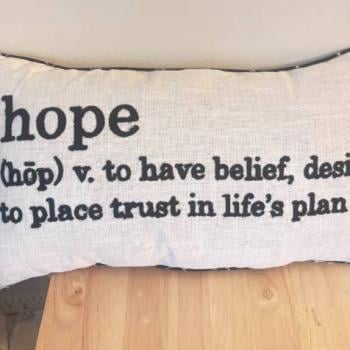
I am currently teaching an Intro to Philosophy Course at our local community college, as I have done a lot of intellectual work preparing for this class, it has inspired a lot of creativity. I will be writing a series of essays around some philosophical concepts each week. Here is a link to my first of these essays: https://www.patheos.com/blogs/loveopensdoors/2024/04/who-we-can-love/
What is a Creedal Faith
A creedal faith is one that declares a certain set of beliefs based on a statement of the shared beliefs of a community in a form which is structured by subjects which summarize its core tenets. For Christians, creeds define the boundaries of what we believe. They serve as our identification. Creeds are not limited to religion. Schools around the world have their alma maters, military units have their creeds and secret societies have their creedos.
As we will see in the next paragraph though, our beliefs can be fluid and changing. With change comes conflict. Today, with the rise of non-religiously affiliated, it may be easy to think that one can’t have a creedal faith. I would challenge and disagree. I later in this essay suggest a Platonist (https://plato.stanford.edu/entries/plato/) dialogue with oneself to determine what one agrees to believe in.
Jacques Derrida and Deconstruction
We are hearing a lot of chatter and seeing a lot of literature these days concerning the act of deconstruction, especially from a faith perspective. Indeed, it seems that the number of people who identify as not religiously affiliated or “nones” is increasing.
The idea of asking questions about our faith is not a new phenomenon nor is the idea of deconstruction. The philosopher Jacques Derrida is considered the main thinker of this concept.
According to Pragati Kalive (https://www.sociologygroup.com/deconstruction-theory// )
Deconstruction theory, derived from the works of philosopher Jacques Derrida, is a theory of literary analysis that opposes the assumptions of structuralism. Its primary purpose is to discern the relationship between text and meaning (Kalive, 2021)
Deconstruction for Derrida was a means to explore the relationship between text and meaning. His work “asserts that meaning is not static and instead continually evolves and varies across time and space”. (Kalive, 2021) This is important linguistically because language is always changing and meaning also changes year to year. For example, the word gay meant something completely different in 1904 than it does in 2024. In biblical studies, contextual criticism is important, and one must consider the socio-political and historical context in which something was written.
While I could probably write a whole essay on Derrida’s thoughts on deconstruction, I will end this section by pointing out that Derrida challenges our Western assumptions of binaries. I would add that we need to consider earlier forms of Platonist dialogue and consider instead of binaries, what something is or who someone is.
A Creedal Faith After Deconstruction
If we consider then how our language changes as our society changes, that our language and its meaning is always in a state of flux and we apply the structure I have provided, reimagining Wesley’s Quadrilateral, then I think we can have a creedal faith after deconstruction.
Almost every morning, I pray the hours and the Apostle’s Creed is part of these hours. It was in a recent reflection that I came up with this post idea. But do I still believe or affirm everything that this creed contains? Absolutely not. So many of my life experiences have left me questioning or even rejecting the language of the creed.
The original Apostle’s Creed
I believe in God,
the Father almighty,
Creator of heaven and earth,
and in Jesus Christ, his only Son, our Lord,
who was conceived by the Holy Spirit,
born of the Virgin Mary,
suffered under Pontius Pilate,
was crucified, died and was buried;
he descended into hell;
on the third day he rose again from the dead;
he ascended into heaven,
and is seated at the right hand of God the Father almighty;
from there he will come to judge the living and the dead.
I believe in the Holy Spirit,
the holy catholic Church,
the communion of saints,
the forgiveness of sins,
the resurrection of the body,
and life everlasting.
Amen.
In my version, I drop much of the patriarchal and imperialistic language of this creed. I also drop some of the mythos around Jesus. In my current walk, I feel that we are too wrapped up in Jesus’ divinity to the point that we don’t focus on his humanity.
Wesley’s Quadrilateral
Approaching this from John Wesley’s point of view, we consider what the bible, tradition, reason and finally what experience tells us about our faith. The problem is that Wesley conceived this concept in the 18th century and for many modern people, especially for the audience this essay is intended for, little or none of what is listed in the creed above may have any relevance, though here is where we can begin.
Richard Rohr Drops Reason
Rohr drops reason. Rohr considers his model a tricycle and focuses on tradition, scripture and experience. He says that we spent 500 years trying to be rational without being rational. Rohr tells us that experience drives the bike and is backed up by tradition and scripture. It is felt that this gives us a better way to deconstruct our faith. In our world today, experiences are everything.
Relativism Instead of Reason
I want to introduce for the sake of argument that alongside of experience, we must consider relativism. In our deeply polarized world today, it is felt that at the moment, there are just some issues that we are not going to agree on. Experience and Relativism allow one to fully own their faith. Faith is simply a subjective experience of divine reality.
A place of spiritual maturity understands this and when one accomplishes this, we can live together with more peace.
If you are lost on your path to faith. If you still want to believe, but are not sure how or if you can, understand that you are on the right path. Faith is not absolute and unchangeable. Faith changes as you change. Your language of faith changes as you change. Spiritual maturity is a lengthy process that seldom accomplish. Stay to the path, discern and discover.
Reference
Kalive , P. (2021, July 22). Jacque Derrida’s Deconstruction Theory – Explained. Sociology Group. Retrieved April 8, 2024, from https://www.sociologygroup.com/deconstruction-theory/
Rohr, R. (n.d.). Another Way to See the Bible: Lesson 4 The Tricycle: Scripture, Tradition, Experience. Retrieved April 8, 2024, from https://cac.org/wp-content/uploads/2018/10/The-Bible_Lesson-4_The-Tricycle-Scripture-Experience-and-Tradition.pdf
Turner , C. (2016, May 27). Jacques Derrida: Deconstruction. CLT. Retrieved April 8, 2024, from https://criticallegalthinking.com/2016/05/27/jacques-derrida-deconstruction/
United States Conference of Catholic Bishops (n.d.). Apostles’ Creed. Retrieved April 8, 2024, from https://www.usccb.org/prayers/apostles-creed













